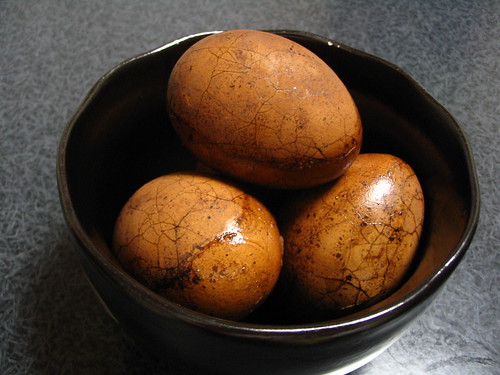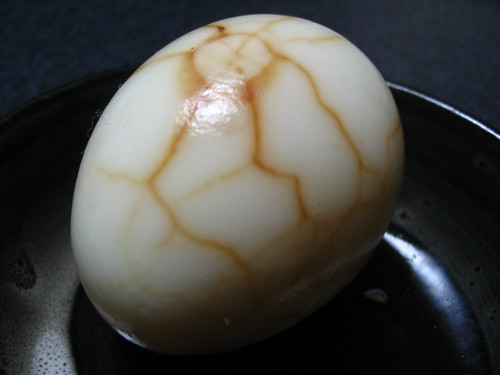Tea Eggs
I'd wanted to try these tea eggs (cha ye dan in Chinese) in Taiwan, but there was so much delicious food crying to be eaten that I never quite got around to it...

Last week B and I were at the Showa Kite Festival when we happened across a stall with Obasans selling local specialties. There were those tea eggs again! Alas, we'd already eaten lunch, so we contented ourselves with buying some locally grown shitake to make dinner with and sampling a few crispy fried senbei.
The mushrooms made a lovely risotto, but the next day the tea eggs were still on my mind. Did they taste like tea? It eventually occurred to me that they probably wouldn't be difficult to make at home.
They weren't, and as one blog comment put it "to the person who is afraid she would screw up tea eggs, there is no way. If they don't taste like you want them to, eat those and try again."
The method below seems to be the general consensus on basic tea eggs, but pepper, salt, orange peel, ginger, garlic, dry sherry and black sesame seeds have all come up in personal recipes, so feel free to experiment with what you have lying around.

Recipe: Tea Soaked Eggs
6-12 eggs
4 star anise
1 cinnamon stick
1/4 cup soy sauce
5 black tea bags or equivalent loose tea
- Place eggs in the bottom of a pot and cover with cold water. Bring the water to the boil, cover and remove from heat.
- Wait 10 minutes or so, then using spoon removed eggs from pot and plunge into cold water.
- When eggs are cool enough to touch, gently tap with a spoon until small cracks form.
- Place eggs back into pot, add remaining ingredients and bring to a boil.
- Reduce heat and simmer for a few hours. This will make your house smell amazing.
- Eat desired quantity of eggs, refrigerate any leftovers still immersed in the simmering liquid.

The flavor was a lot milder than the wonderful fragrance wafting from the pot, but it was definitely a new and delicious twist on the standard hard boiled egg. Next time I might use a little more soy, ginger, or oolong tea, which apparently gives a nice smokey undertone.
If you want something a little less subtle, try mixing some of the simmering liquid with a little soy and sesame oil and using it as a dipping sauce for the egg. I ate a few that way and the tea and spice flavor really came through, but they were also good with just a dash of salt and pepper.
I think the spiderweb patterns the cracks make on the eggs are beautiful (though not too good to eat!), and next Easter I'm going to try dying a few eggs the same way.


1 comment:
these look great!
Post a Comment